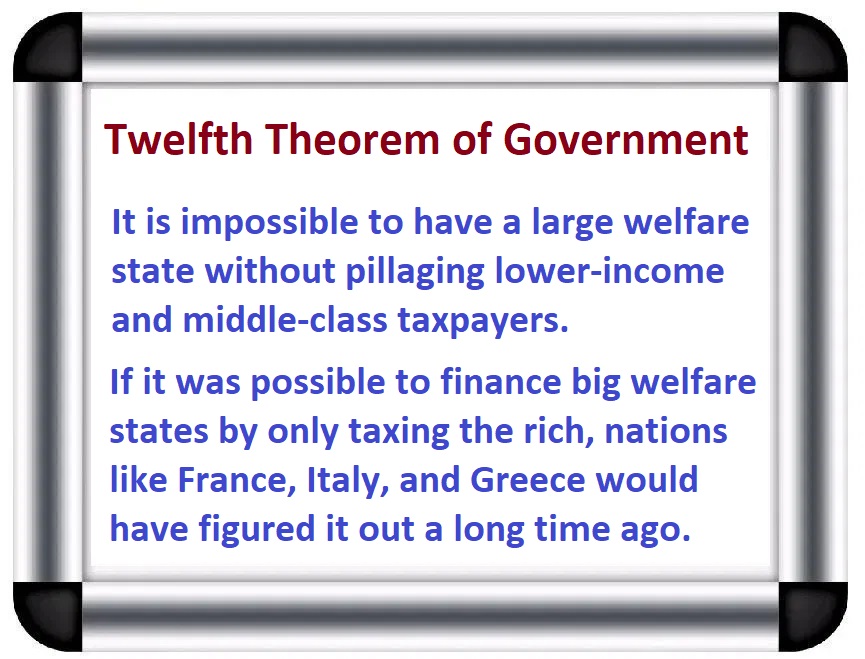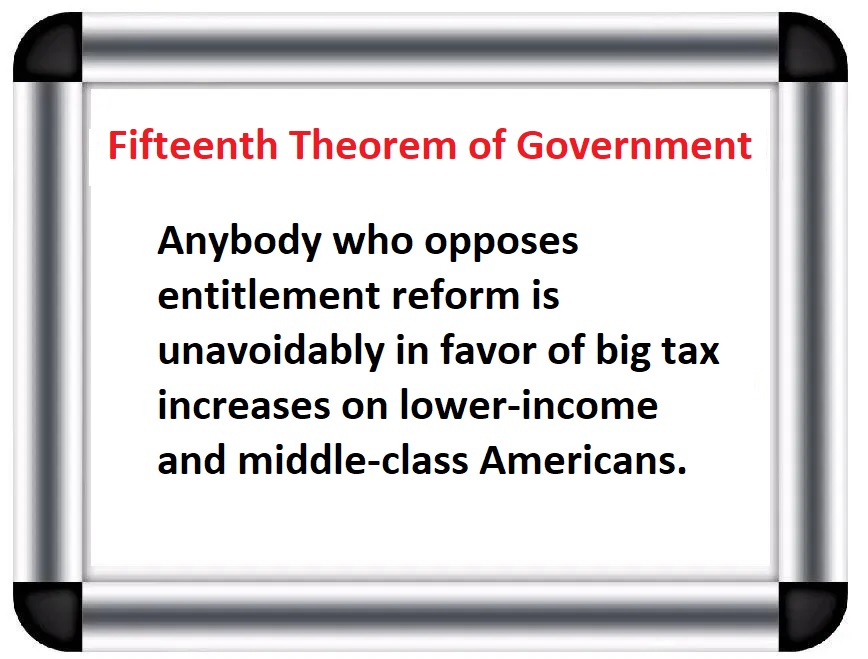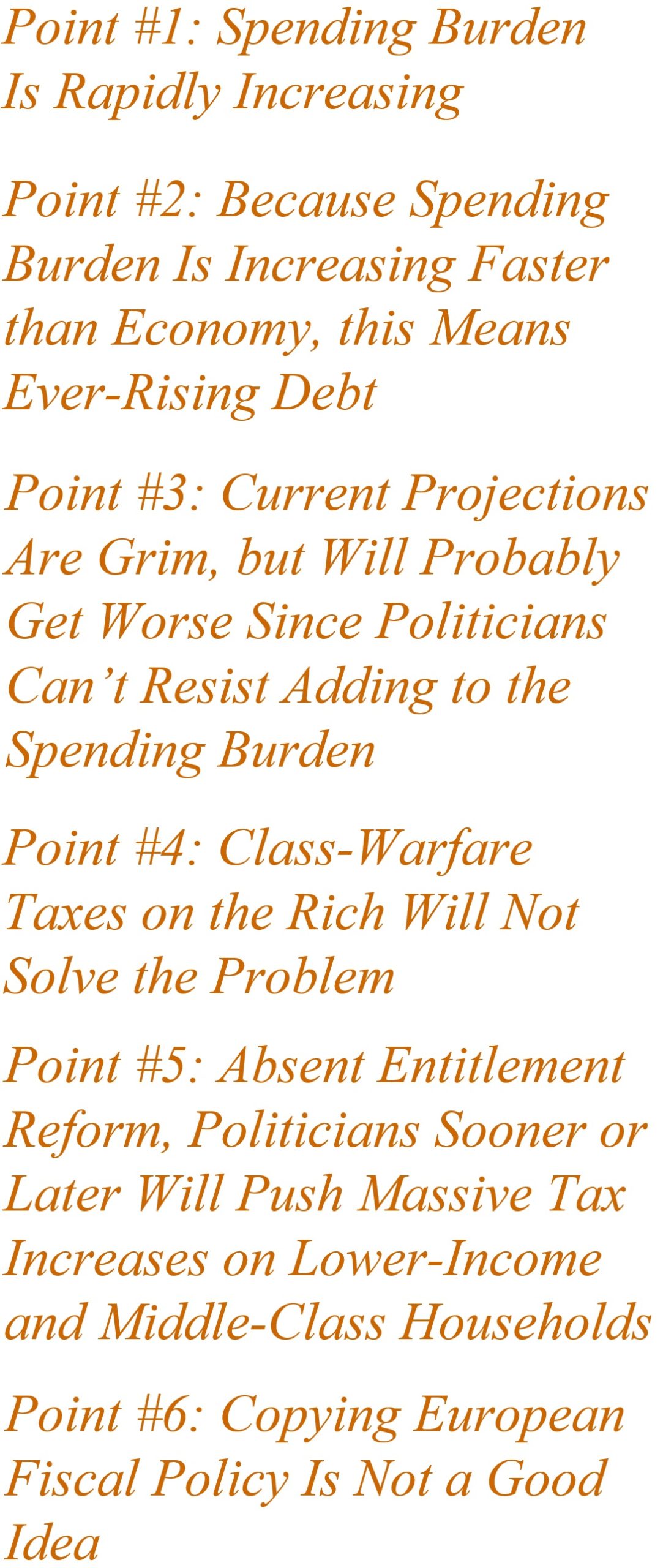The combination of demographic change and poorly designed entitlement programs is producing an ever-increasing burden of federal spending.
In my Twelfth Theorem of Government, I pointed out that this inevitably will mean big tax increases on lower-income and middle-class households.
As stated in the Theorem, if there was a way of financing big government by only taxing the rich, other nations already would have made that choice.
Some of them have tried, but there simply are not enough rich people to finance large welfare states.
But I don’t want any tax increases. Class-warfare tax increases are a bad idea, and so are tax increases on regular people.
It would be much better for the country to reform entitlement programs.
 But many politicians (both Democrats and Republicans) disagree.
But many politicians (both Democrats and Republicans) disagree.
However, that means they want big tax increases on lower-income and middle-class household.
To emphasize this point, I unveiled my Fifteenth Theorem of Government, which drives home the point that you can’t have big government without pillaging ordinary people.
I pontificated on this issue today in a MoneyShow presentation.
There were lots of charts to justify my two theorems, but these six points hopefully are a good summary of my argument.
For what it’s worth, the first five points are basic math.
Indeed, there are some honest folks on the left (including Paul Krugman) who have made similar observations.
My final point is where the honest leftists and I have a big disagreement. They think it would be a good thing to copy Europe. But I think that would be crazy since European living standards are much lower because of bloated welfare states.

[…] stated, as explained in my Fifteenth Theorem of Government, there is no way to have European-sized government without European-level taxes on lower=income and […]
[…] Speaking earlier this year to the Mackinac Center in Michigan, I warned they both implicitly favor massive tax increases on ordinary households. […]
[…] Speaking earlier this year to the Mackinac Center in Michigan, I warned they both implicitly favor massive tax increases on ordinary households. […]
[…] Bad Math Leads to Bad Economics — International Liberty […]
“Point #5: Absent Entitlement Reform, Politicians Sooner or Later Will Push Massive Tax Increases on Lower-Income And Middle-Class Households.”
I don’t think so. Entitlement reform is politically unpopular. So, politicians aren’t going to do entitlement reform. Tax increases on low-income and middle-class households are politically unpopular too. So, politicians aren’t going to do tax increases on low-income and middle-class households either.
Instead of doing entitlement reform or increasing taxes on low-income and middle-class households, politicians will take the path of least resistance, which is to crank up the printing presses over at the Federal Reserve. Politicians don’t even get involved with the Federal Reserve’s cranking up its printing presses, which gives politicians great cover.
Inflation is our destiny.
Chuck Wright
Dan, you write that “European living standards are much lower because of bloated welfare states.”
The list of countries with the highest levels of GDP per capita, as measured in 2019 by the International Monetary Fund, are the following:
1st – Luxembourg, with 113,196 dollars per capita.
2nd – Switzerland, with 83,716 dollars per capita.
3rd – Macau (Chinese special administrative region), with $ 81,151 per capita.
4th – Norway, with 77,975 dollars per capita.
5th – Ireland, with 77,771 dollars per capita.
6th – Taste, with 69,687 dollars per capita.
7th – Iceland, with 67,037 dollars per capita.
8th – USA, with 65,111 dollars per capita.
9th – Singapore, with 63,987 dollars per capita.
10th – Australia, with $ 53,825 per capita.
If you Google “List of Countries by Social Welfare Spending” you will find that among OECD countries we rank near the middle (21st of 36 countries). Hardly cataclysmic. Among the countries listed below us include three countries that are widely regarded as well-to do (two of the three are above us on the list of GDP per capita) with poverty rates at least 50 percent lower than ours. They are the Netherlands, Switzerland, and Ireland. So they seem to prosper without “bloated welfare states.”
Your link at the end of your post to “European living standards are much lower) is very misleading. One, by using average rather than median figures you distort the picture because there are so many more super wealthy in the U.S. that drive up our average. Two, you refer to OECD data to show that “European” living standards are lower than those in the U.S., but you overlook that fact that nine of the countries in your chart are not even European.
You write (in 2021): “The moral of this story is that ordinary people are better off in America.
And that’s almost certainly because there’s generally more economic freedom in the United States…”
Really? We rank twenty-fifth in the world in economic freedom. Ten years ago we were 17th. We’re hardly leading the world. And yet we are very wealthy. No one would deny that. It is interesting, however, to note that when you recently published a chart showing median disposable household income, the gap between the U.S. and our wealthy European countries shrunk rather dramatically. And when you take into account they things they don’t have to pay for out of their disposable income, they very well might come out ahead.
Excellent, so when is your book coming out?